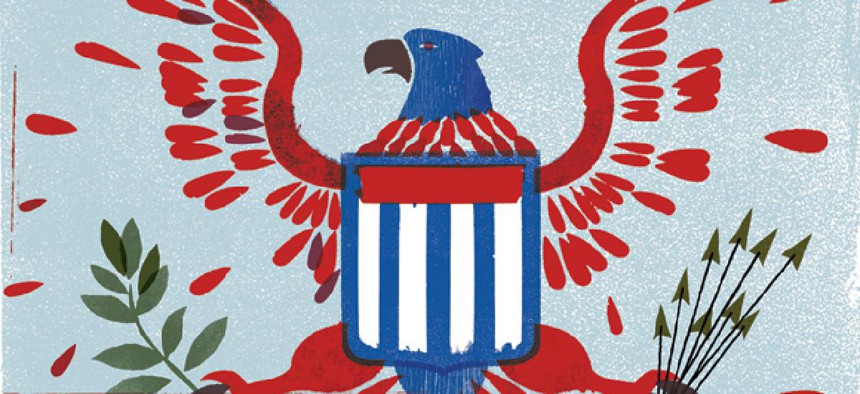
The Heads of State
What do people want from government?
Elections will test whether citizens actually want a smaller federal footprint.
How much government do people want?
With the presidential election approaching, answers to that question could shed light not only on prospects for the candidates, but also on their ability to reshape the public sector if elected.
Historians would note the nation was founded in revolution against oppressive government. And still today, many would agree with Ronald Reagan’s view that “government is not the solution to our problem; government is the problem.”
But we have seen an inexorable march toward bigness. Federal, state and local governments now consume about 35 percent of our gross domestic product. The public sector arguably is as big as in European nations when one counts “tax expenditures” promoting home ownership, employer-provided health care and other purposes. Beyond spending, public agencies at all levels have woven a complex and extensive network of regulation.
The question is timely not only because of this year’s elections, but also because big government is being put to the test—in Washington to be sure, but even more starkly in state capitals, city halls and county seats. Washington can borrow profusely to fund its spending desires, but that’s not true beyond the Beltway, where real choices about public services are being made to satisfy requirements for budget balance.
More than 600,000 public sector jobs have been eliminated, so public schools have larger classes; state university systems are cutting staff and raising tuition; and communities are losing police, fire, library and other public services.
Do people care? Are they ready and willing to make do with smaller government? If the states are laboratories of democracy, the answers may hold lessons for our leaders in the nation’s capital.
The 2010 congressional elections that brought many Republicans to power were the last significant test of the popular mood about federal government. But then, this spring, another test of political philosophy emerged in Wisconsin, long a bastion of liberalism. Public sector unions, deprived of collective bargaining rights by a GOP-controlled government led by Gov. Scott Walker, mounted a recall effort that served as a magnet for the fundraising and organizing powers of both parties. When Walker beat back the recall, some saw another sign of fatigue with activist government.
This fall’s contest between President Obama and his Republican challenger, Mitt Romney, is stacking up as a historic test that will set the course of government for years to come. On issues like taxation, spending, regulation of banking and the environment, incentives for energy production, the structure of Social Security and Medicare, and more, the choice is more consequential than any in recent times.
In the August issue of Government Executive, Editor at Large Timothy B. Clark explores Americans' views of government. Click here to read the full story.







